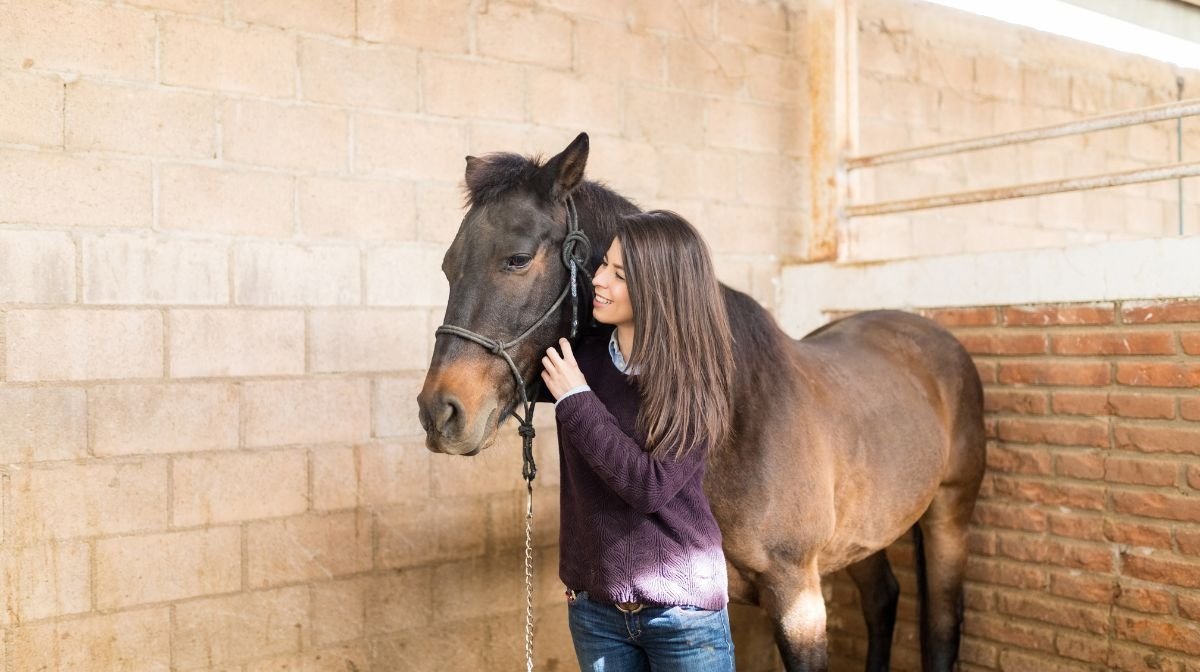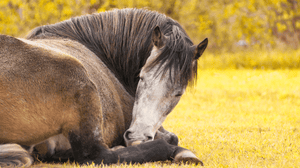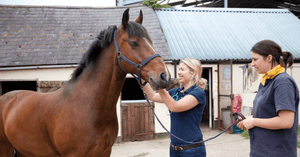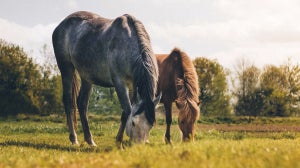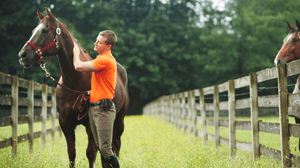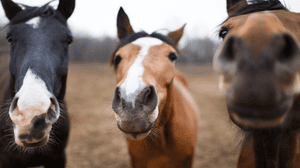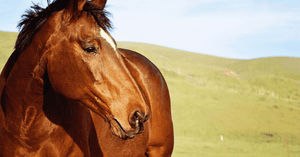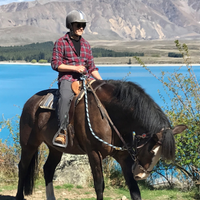
When it comes to the health of your beloved horse or pony, diarrhoea can be a concerning and sometimes alarming issue. Diarrhoea, characterised by loose, watery stools, is not uncommon in horses and can be caused by a variety of factors.
In this comprehensive guide, we will explore the potential causes of diarrhoea in horses and provide helpful insights on how you can treat and manage this so your horse is fighting fit.
- Understanding Diarrhoea in Horses
- Potential Causes of Diarrhoea in Horses
- Recognising the Signs of Diarrhoea
- Diagnosing the Underlying Cause
- Treatment Options for Diarrhoea in Horses
- Preventing Diarrhoea in Horses
- When to Consult a Vet
- Conclusion
Understanding Diarrhoea in Horses
Diarrhoea is a condition where the faeces are excessively loose and watery. It’s important to distinguish between an isolated loose stool and true diarrhoea, as horses can occasionally have soft stools without it indicating a severe problem.
True diarrhoea typically involves recurrent & persistent loose stools and can be a sign of an underlying issue that requires attention from your vet.
Potential Causes of Diarrhoea in Horses
Dietary Factors: One of the most common causes of diarrhoea in horses is dietary-related issues. Sudden changes in diet, like eating spoiled or mouldy feed, overeating, or ingestion of toxic plants can all lead to their digestive system being upset and subsequent diarrhoea.
Parasitic Infections: Intestinal parasites, such as worms, can cause irritation and inflammation in the horse's gut, leading to diarrhoea. Regular worm testing (worm egg counts, saliva tests etc) is crucial to monitor for the presence of worms, with deworming treatment to be given if required.
Bacterial Infections: Bacterial infections, such as Salmonella, can lead to severe cases of diarrhoea in horses. Horses are often infected by coming into contact with other horses that are actively shedding the bacteria in faeces, or by coming into contact with contaminated feeds, water and other objects on the yard like buckets.
Viral Infections: Very occasionally, some equine viruses can cause gastrointestinal symptoms, including diarrhoea. It's essential to consult a veterinarian if you suspect that your horse has a viral infection.
Stress: Horses are sensitive animals, and stress can certainly disrupt their digestive system. Changes in routine, transportation, or exposing them to new or unusual environments can trigger stress-induced diarrhoea.
Medications: Some medications, especially antibiotics, can disrupt the natural balance of gut bacteria, leading to diarrhoea as a side effect.
Colic: Diarrhoea can sometimes be a symptom of colic, a severe abdominal issue in horses. Colic-related diarrhoea often accompanies other signs of colic distress, such as restlessness, pawing, and sweating. If you suspect your horse has diarrhoea, please contact your vet immediately.
Inflammatory Bowel Disease: Inflammatory bowel disease (IBD) can cause chronic diarrhoea in horses, which is categorised as diarrhoea lasting for more than 2 weeks. IBD is characterised by persistent inflammation in the intestinal lining, and can be caused by various underlying factors. This certainly warrants investigation from your vet.
Recognising the Signs of Diarrhoea
To effectively address diarrhoea in your horse, it's crucial to recognise the signs and symptoms. Besides the obvious loose stools, keep your eyes out for the following:
Dehydration: Diarrhoea can lead to a quick loss of fluid, which can result in dehydration. Signs of dehydration include sunken eyes, dry mucous membranes, and other symptoms.
Lethargy: A horse with diarrhoea may appear sluggish and less energetic than usual.
Loss of Appetite: Diarrhoea can cause a loss of appetite in horses. A horse that refuses to eat or eats significantly less than usual may be suffering from gastrointestinal distress.
Abdominal Pain: Some horses with diarrhoea may show signs of discomfort or pain, such as pawing, rolling, or lying down more than usual.
Fever: An elevated body temperature can be a sign of an underlying infection, which might be causing the diarrhoea.
Diagnosing the Underlying Cause
When your horse is experiencing diarrhoea, it's essential to consult a veterinarian quickly so they can help you. They will perform a thorough examination and may recommend additional tests to discover the underlying cause. Some measures for finding this out might include:
Faecal Examination: Checking the horse's faeces for parasites or abnormal bacteria can help identify some common causes of diarrhoea.
Bloodwork: A complete blood count (CBC) can provide valuable information about the horse's overall health and any signs of infection or inflammation.
Rectal Exam: A rectal examination allows the vet to assess the condition of the horse's intestinal tract and check for anything out of the ordinary.
Ultrasound: In some cases, an abdominal ultrasound may be necessary to see the internal structures and identify whether any issues are occurring.
Treatment Options for Diarrhoea in Horses
The treatment for diarrhoea in horses depends on the underlying cause and the severity of the condition. Here are some common treatment approaches:
Fluid Therapy: Dehydration is a significant concern with diarrhoea. In severe cases, Your veterinarian may even administer intravenous (IV) fluids to correct any fluid imbalances. In some cases, oral electrolyte supplements can be given if the horse is still able to drink or eat.
Managing Diet: If the diarrhoea is related to the horse’s diet, it's crucial to remove the food or plants that are causing the issues from the horse's diet. You should then transition them back to a normal, balanced diet gradually, so that they can avoid any upsets in their digestion.
Medication: Depending on the diagnosis, your vet may prescribe medications for your horse to address the specific cause of diarrhoea. Antibiotics may be necessary for bacterial infections, while there are also antiparasitic medications which can treat worm infestations.
Isolation: If the diarrhoea is due to a contagious disease, isolating the horse that’s affected is essential to prevent its spread to other horses.
Reducing Stress: If stress is a contributing factor, you should consider ways to reduce the horse's anxiety and put them in a more calm and relaxed environment. This may involve keeping the horse in a familiar stall or pasture, helping to maintain a consistent routine, or even using calming supplements if need be.
Monitoring Your Horse: Regular monitoring of the horse's condition is vital during and after treatment. Keep an eye on their faecal consistency, hydration levels, and overall behaviour. It could be an indication that they’re on the mend!
Preventing Diarrhoea in Horses
Preventing diarrhoea in horses is often more straightforward than treating it. Here are some essential steps you can take to minimise the risk:
Proper Nutrition: Maintain a consistent and balanced diet for your horse. Avoid abrupt dietary changes, and always provide fresh, clean water.
Deworming: Follow a regular worm testing schedule as recommended by your vet, treating when appropriate, to prevent parasitic infections.
Hygiene: Ensure that your horse's environment is clean and well-maintained. Clean your horse’s stable regularly and provide them access to clean water.
Stress Management: Minimise things in your horse's life that stress them as much as possible. Gradual changes in routine and a calm, predictable environment can be great at reducing stress or helping them acclimatise to something new.
When to Consult a Vet
If your horse experiences diarrhoea that lasts for more than a day, or if the diarrhoea is accompanied by other worrying symptoms such as fever, lethargy, or abdominal pain, it is very important to consult a veterinarian immediately.
Early intervention can stop the condition from worsening and greatly improve the chances of a full recovery!
Conclusion
Diarrhoea in horses can be a challenging and worrisome condition, but with timely intervention and proper care, most cases can be managed and fixed. Recognising the signs of diarrhoea, understanding its potential causes, and seeking quick veterinary care are important steps to ensure their well-being is as good as it can be.
Remember - prevention is often the best medicine. By getting ahead of it and creating good management routines, like maintaining a balanced diet, practising proper hygiene, and following a worm testing schedule, you can greatly reduce the risk of diarrhoea and other gastrointestinal issues in your horse.
In times of uncertainty or when you suspect a problem, never hesitate to reach out to your qualified veterinarian. They’re the most knowledgeable people for the situation and have the expertise to identify the underlying causes of diarrhoea and create a tailored treatment plan to help bring your horse to a speedy recovery!
Looking after your horse’s health is crucial, and by staying informed and proactive, you can help ensure a long and happy life for them.

